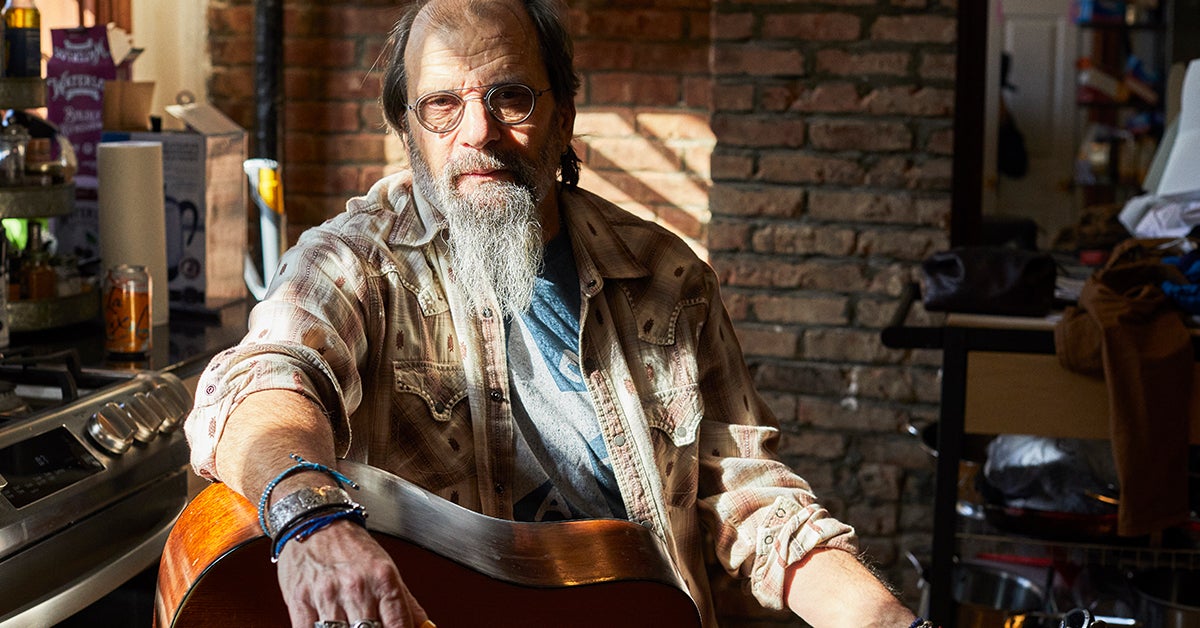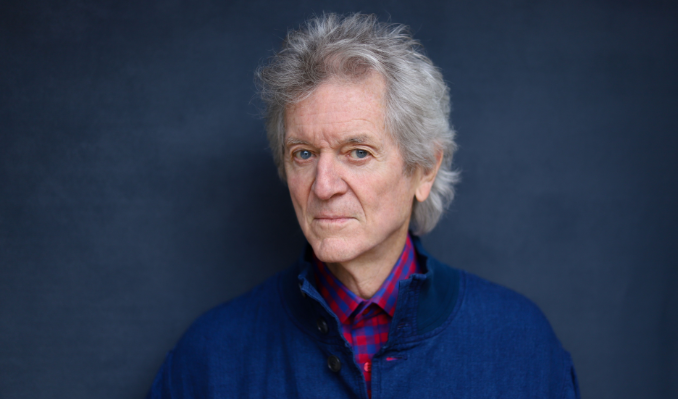Steve Earle

Artist Information
Last June, Steve Earle traveled to Luckenbach, Texas, about an hour away from where he grew up, to play an outdoor concert celebrating the life of Jerry Jeff Walker. Walker – the colorful cowboy troubadour whose ballad “Mr. Bojangles” marked a new era of imaginative folk songwriting – had died at 78 from throat cancer. His wife Susan threw a party for his fans, with Emmylou Harris, Ramblin’ Jack Elliot, Jimmy Buffett all singing Walker’s songs and telling stories. “At one time, many of us thought we would live forever,” said Susan, who married Walker in 1974. “At least we acted like it. But not one of us thought Jerry Jeff would.” Earle went onstage toward the end of the night. He chose to perform “Hill Country Rain,” a joyous 1972 singalong. ‘Cause I got a feeling Something that I can't explain It's like dancing naked In that high hill country rain “It’s in a bizarre tuning that he made up,” says Earle. “But that was his opus, really. That was full-blown hippie music. That’s all I wanted at that moment. The Texas I grew up in was headed for being more like Southern California”.
The event transported Earle back to his teens, when “I wanted to be Jerry Jeff Walker more than anything else in this world,” he said. Earle, 67, first heard Walker when he was 14 years old. His high school drama teacher, Vernon Carroll, gave him a copy of 1968’s Mr. Bojangles. He was staging The World of Carl Sandburg, a play of Sandburg’s poetry and prose, and wanted Earle to sing “Mr. Bojangles,” Walker’s classic ballad about an unforgettable character he met in a New Orleans jail (Sandburg was an avid song archivist). The album was a revelation. Earle started learning about Walker, who was born in Oneonta, New York and played psychedelic rock in Greenwich Village before busking around the country, changing his name and becoming one of Texas’s most beloved songwriters. “He literally hitchhiked to gigs. I was trying really hard to be Jerry Jeff for a period. I would show up a little too lit to play gigs sometimes. My hair was kind of long; and I started wearing cowboy hats.” Earle got to know Walker in Nashville in the mid-70s, when Walker enlisted Earle as his designated driver. “He was a perpetual motion machine,” says Earle, remembering the night he drove Walker to meet a friend named Neil, who turned out to be Neil Young.
“That was a big deal,” says Earle. Earle laughs remembering the moment Walker handed him a guitar and asked him to sing Young a song by folk singer David Olney. “That was a little insulting. It hurt my feelings a little bit.” After Walker’s memorial, Earle booked time at Electric Lady Studios to make a tribute album of Walker’s songs, much like he did on 2009’s TOWNES and 2019’s GUY, made after the deaths of Townes Van Zandt and Guy Clark. (Last year, Earle also recorded the heartbreaking J.T., featuring the brilliant songs of his son Justin Townes Earle, who died at 38 years old in 2020). Earle has said these projects were a necessary form of therapy, and they stand as some of his best records. “My band played their asses off, per usual,” says Earle of the JERRY JEFF sessions. He isn’t kidding. Earle delivers a gorgeous, soulful “Mr. Bojangles,” and howls joyful takes of “Charlie Dunn,” Walker’s endearing tribute to the bootmaker, and “Gypsy Songman,” his stomping busking anthem. Earle was also excited to include some of Walker's lesser-known classics – meditative ballads like 1969’s “Old Road” and 1973’s “Wheel.” “There’s a tendency to think of Jerry Jeff around a relationship to one song,” he says, referring to “Mr Bojangles,” which was covered by everyone from Bob Dylan to Sammy Davis Jr. “And he was also such a great interpreter of other people's songs and such a champion of other people's songs. But my main purpose of this was to remind people that he wrote a lot of fucking great songs.” “This record completes the set, the work of my first-hand teachers,” Earle writes in the liner notes. “The records were recorded and released in the order in which they left this world. But make no mistake – it was Jerry Jeff Walker who came first.” JERRY JEFF is Earle’s 22nd album. He’s released nearly an album a year since getting sober in the mid 1990s, LPs ranging from bluegrass to blues to folk to country. One of America’s most gifted living songwriters, he is singing better than he ever has, working harder. At the moment, he’s writing two books, his second play, and hosts his long running The Steve Earle Show: Hardcore Troubadour Radio on Sirius XM. Throughout the pandemic, he also hosted Steve Earle’s Guitar Town, a YouTube series about his massive instrument collection.
“I'm just trying to stay out of trouble,” says Earle with a laugh. "If I stay busy, then I'm OK.” ## Earle remembers exactly when he knew he wanted to be a songwriter. He was barely a teenager, growing up in Schertz, Texas, looking over a copy of a Beatles record. “The little line in parentheses next to ‘I Want to Hold Your Hand,’” said ‘Lennon-McCartney,’ Earle says. “I said, ‘I know who those guys are.’ And then I figured out that they wrote the song. And so that was when I started, you know, trying to write songs. They all had girls' names for titles for a long time.” Music was a big deal in Earle's family and his dad, an air traffic controller, played piano. “My dad wouldn’t let me have an electric guitar,” he says. As a teen, he discovered Bob Dylan, Crosby, Stills, Nash & Young, Paul Simon and the Johnny Cash Show. “I always say my job was invented by Bob Dylan,” says Earle. “I’m a firm believer that rock & roll only becomes an art-form because of the lyrics. If it hadn’t been for Bob Dylan wanting to be John Lennon and John Lennon wanting to be Bob Dylan, it wouldn’t have been cranked up to the level of literature that makes it OK for rock & roll to be taken seriously.” Though he read constantly, Earle was a poor student. He dropped out by 14, and often stayed with his uncle, Nick Fain, who was five years older and living in Houston. Earle moved to the city, where Townes Van Zandt was known to spend time, and began playing Sand Mountain Coffee House, which had a mural featuring Van Zandt, Guy Clark and Jerry Jeff Walker. “I could see the mural very clearly because nobody was there when I played, for the most part,” Earle jokes. In Houston, Earle came face to face with Van Zandt. Van Zandt dropped in on one of his gigs at the Old Quarter and began heckling Earle, telling him to play the “The Wabash Cannonball.”
Instead, Earle played Van Zandt’s “Mr. Mudd and Mr. Gold.” “I played that and he shut up,” said Earle. To Earle, Van Zandt was “a really good teacher and really bad role model.” Their relationship could be both violent, cruel and hilarious; Van Zandt told Earle to read War and Peace, so he did: “ I found out later Townes hadn’t actually read War and Peace. He just thought I should read it.’” “I committed to making art whether I ever got rich or not by Townes’s example,” says Earle. Steve hitchhiked to Nashville in 1974, and tracked down his other favorite songwriter, Guy Clark. Earle joined Clark’s band as a bass player and played on Clark’s 1975 album Old No. 1, and sang on the classic “Desperados Waiting for a Train.” A 20-year-old Earle can be seen in the classic 1977 documentary Heartworn Highways, playing “Stay a Little Longer" at Guy and Susanna Clark’s kitchen table on Christmas Eve. “I was so lucky to get there, because what you are seeing there, in that picture, is the big holiday celebration of a salon—a group of people that were all associated to each other by art,” Earle said. “That’s what our relationship was, and it was strong. And it was a huge thing to be part of.” Earle was happy scraping by as an underground songwriter – until his son Justin Townes was born in 1982. “I was in a panic. I had to feed this kid, so I tried my best to write what I thought were commercial songs.” His first album, 1986’s Guitar Town, was a searing new take on rockabilly and country-rock, with sharp lyrics about small town characters and life on the road (“I gotta two pack habit and a motel tan,” he sang on the title track.) It hit Number One on the country charts and was nominated for two Grammys. “I convinced myself that I could make country records that were art and get on the charts.”
Earle doubled down on that promise on 1988’s Copperhead Road. The title track, with its mandolin-thrashing title track about a Vietnam War veteran who enters the marijuana business, sounded like nothing else at the time (it still doesn’t.) Earle convincingly stepped into the shoes of any character he wished: a homeless alcoholic on “The Wall” or a conman Reagan fan (“Snake Oil”). The album also featured “The Devil’s Right Hand," an effortless tale of gun violence, that was recorded by Waylon Jennings, Bob Seger and Johnny Cash. Rolling Stone gave Copperhead Road four stars, saying it was “…like a twangy version of the Stones' Exile on Main Street.” Earle was playing arenas and getting played on MTV. But he was also struggling. “I shot myself in the foot for several years,” he says. He became addicted to heroin, leading to fights and arrests. He lost his record contract after 1990’s dark The Hard Way, and sold his motorcycles, cars, guitars, and jewelry to feed his habit. “I lost everything but my house,” he said in 2017. “I guess it’s because I couldn’t figure out how to put it in the car and take it to the pawn shop.” Earle was arrested twice in the 1990s for drug possession, and sentenced to a year in jail. He served 60 days before entering rehab. “If I didn’t change, I’d be dead.” Earle has been sober – and wildly prolific – ever since.
After getting clean, he recorded 1995’s Train a Comin’, a bluegrass-influenced LP that drew on some of his earliest songs. It was nominated for a Grammy, and he followed it up with 1996’s plugged in I Feel Alright, then 1997’s El Corazon, which the AP voted as one of the best pop albums of the 1990s. These albums contained some of Earle’s most famous classics (“The Galway Girl,” “Hardcore Troubadour”). In 2000, Earle released Transcendental Blues, which finished with “Over Yonder (Jonathan’s Song).” Earle wrote it about Jonathan Nobles, a Texan who had been sentenced to death in 1986 for a double murder he had committed on drugs. Nobles had been convicted largely on the strength of his own confession, and exchanged letters with Earle for a decade, inviting the singer to witness his execution. “You can't believe it's really happening,” Earle said later. “I remember afterwards I thought, 'did I black out and miss it? I let Jonathan down.' Then the blank filled in… it was the shock… I realized exactly what I'd seen.” Earle has campaigned relentlessly against the death penalty, performing annually outside the Supreme Court for participants in an annual vigil protesting the Court's 1976 decision restoring execution as a legal form of punishment. In 2010, Earle was awarded the National Coalition to Abolish the Death Penalty's Shining Star of Abolition award. He’s continued to use music as a vehicle for activism. 2004’s The Revolution Starts Now protested the Iraq War. The album won a Grammy — the first of three he’s won in the last several years. “The youngest part of my audience I acquired during the '04 and ’08 election cycles,” he says. “It comes from the political stuff. You can always tell you're getting older when the lines are longer at the men's room than the ladies room at your shows.”
Earle has also published both a collection of short stories (2001's Doghouse Roses) and an acclaimed novel (2011's I'll Never Get Out Of This World Alive). He has produced albums for other artists such as Joan Baez, and Ron Sexsmith, and has acted in films, and television (including David Simon's highly celebrated The Wire and Treme). Earle moved to New York in 2005. One reason was he wanted to start writing songs for theater. He’d been a fan of the theater since spending time with his grandmother, a seamstress in a local college drama department, and wrote Karla, about Karla Faye Tucker, the first woman sentenced to death in the United States since the Civil War. The play debuted off-Broadway, and he’s since acted in The Exonerated, Jessica Blank and Erik Jensen's play about the wrongfully imprisoned. In 2017, he wrote the music for Richard Maxwell’s play Samara that debuted at the Soho Rep. In 2020, Earle appeared in Blank and Jensen’s Coal Country, a documentary play that explores the aftermath of the West Virginia mine explosion of 2010. That acclaimed play recently reopened nearly two years after being shut down due to the pandemic, with Earle providing the music on stage every night (as featured on his 2020 studio LP Ghosts of West Virginia). Earle is already deep into writing his next stage project, an adaptation of Horton Foote's Tender Mercies, with Foote’s daughter Daisy. “I'm a really good songwriter living in New York. It's stupid for me not to try to write a musical. It’s just dumb.” These projects have allowed Earle to stay close to home to focus on his other job, as a dad. During the school year, Earle likes to stay in New York with his son, John Henry, who has autism.
Most days are the same; Earle wakes up at 6 a.m., practices yoga; then rides the subway with him to school in Chelsea. “I have friends that come to see John Henry because it makes them feel better, because he’s just kind of all love,” Earle says. “He’s my favorite person to hang out with at this point in my life.” For the last seven years, Earle has staged the John Henry’s Friends benefit at New York’s Town Hall to benefit the Keswell School, which John Henry attends. A few weeks after the most recent benefit, which featured Bruce Springsteen, Earle is still buzzing from that night. “I've seen a lot of Springsteen shows, and this is as good as I've ever seen him for the four songs that he did. And I had the best seats I've ever had, that's for sure.” Earle has the rest of 2022 mapped out. After the release of JERRY JEFF, he’ll hit the road on June 1st with the Dukes. After that, he’ll teach Camp Copperhead, his songwriting camp, in Big Indian, New York, and then put John Henry back in school and start up work again on Tender Mercies. “It’s always been on my own terms,” Earle says. “My career maybe isn’t as big as it could be. But it would be unseemly for me to complain too much. … I still feel lucky to be able to make a living doing something that I love. And I still make an embarrassing amount of money for a borderline Marxist”.
Upcoming Performances
Titan of Twang: A Celebration of Duane Eddy
with Peter Frampton, Vince Gill, Albert Lee, Joe Bonamassa, Steve Earle, Beth Nielsen Chapman, Buddy Miller, Molly Tuttle, JD McPherson, Slim Jim Phantom, Jennie Vee, Toby Lee, The Del McCoury Band, Grace Bowers & More To Be Announced. Hosted by Jim Lauderdale
Stay In Touch
Skip the FOMO, we’ll make sure you don’t miss a thing! Sign up for exclusive updates, events, and offers – just for fans like you.










